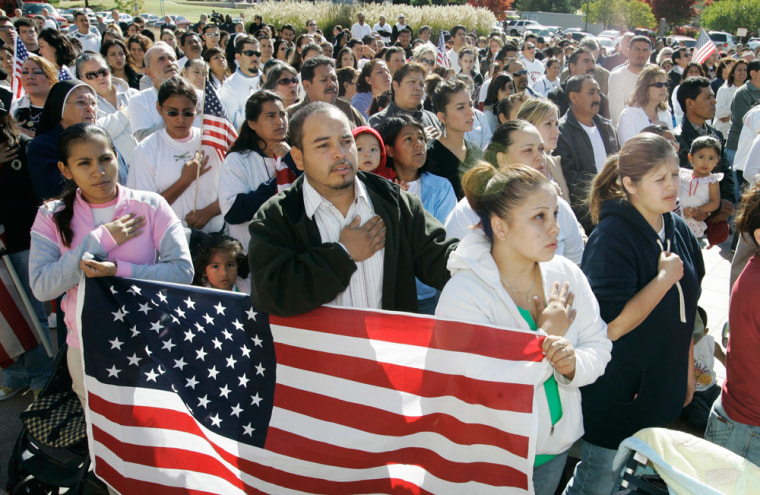State lawmakers around the country are proposing hundreds of bills this year aimed at curbing illegal immigration, but experts say the cost and public opposition will keep many from becoming law.
Lawmakers in at least eight states are now sponsoring legislation similar to Oklahoma, which last May passed the nation's most comprehensive anti-immigration law.
It restricts illegal immigrants' access to driver's licenses and other IDs, limits public benefits, penalizes employers who hire them and boosts ties between local police and federal immigration authorities.
The bills are among more than 350 immigration-related proposals unveiled in state legislatures in the first two months of this year, according to a count by The Associated Press.
Sharma Hammond, staff attorney for the legal arm of the Federation for American Immigration Reform, believes states have been galvanized by the collapse two years running of a congressional solution.
"They feel like they have to take it into their own hands because the federal government is doing nothing," said Hammond, whose group helps states write the comprehensive bills and favors a freeze on nearly all immigration.
But it's questionable how many of the bills will become law. Many quickly lose momentum after they're introduced.
Out of more than 100 bills dealing with illegal immigration in the Virginia statehouse, only a few minor ones were likely to pass as the session was scheduled to end Saturday.
In Florida, lawmakers have proposed nearly a dozen bills targeting illegal immigration since January. But at a recent press conference at the state capitol, only two of the bills' backers showed. None of the state House leadership has offered support.
"People are still trying to keep this alive and get the federal government to pass something," said Ann Morse of the National Conference of State Legislatures, which tracks the bills. "But now that the legislation is introduced, states are wondering is this something we need to do right now, or do we need to study it more."
Morse thinks the new comprehensive bills are partly a tool to draw public attention to the issue, especially in an election year. She noted they tend to come with official titles such as "Taxpayer and Citizen Protection Act."
Legal and financial woes
Last year, more than 1,500 anti-illegal immigrant laws were proposed nationwide, with nearly 250 passing, according to a count by the National Conference of State Legislatures. And some of that legislation is now creating legal and financial trouble for state governments.
The Oklahoma law still faces a legal challenge by the U.S. Chamber of Commerce. In Colorado, a proposal to boost the state's immigration enforcement unit may be doomed by its $3.9 million price tag.
Although the University of Arizona saved roughly $70,000 last year by identifying illegal immigrants who are ineligible for in-state tuition under a new law, it estimates the annual cost of identifying such students will be equal if not greater than the savings.
John Trasvina, president and general counsel of the Mexican-American Legal Defense and Education Fund, said despite the flurry of new bills, he believes anti-immigrant sentiment is starting to cool somewhat.
'No longer a free ride'
In part, states may be responding to a national shift, with immigration taking a back seat to the economy and the war in Iraq. All three of the major presidential candidates support a comprehensive immigration law that would eventually legalize many of the country's 12 million illegal immigrants.
"States are finding it's costing them a lot of money," Trasvina said. "It's no longer a free ride, a quick press release."
Maryland Senate President Thomas V. Mike Miller summed up the perspective of a number of state legislatures.
"I don't think that the votes are there to pass a bill in terms of changing the status of immigrants in the state," Miller said. "That means not punitively and not to give them any form of tax advantages either."
The one bill likely to pass in Maryland this year: a study of the effects of immigration.
